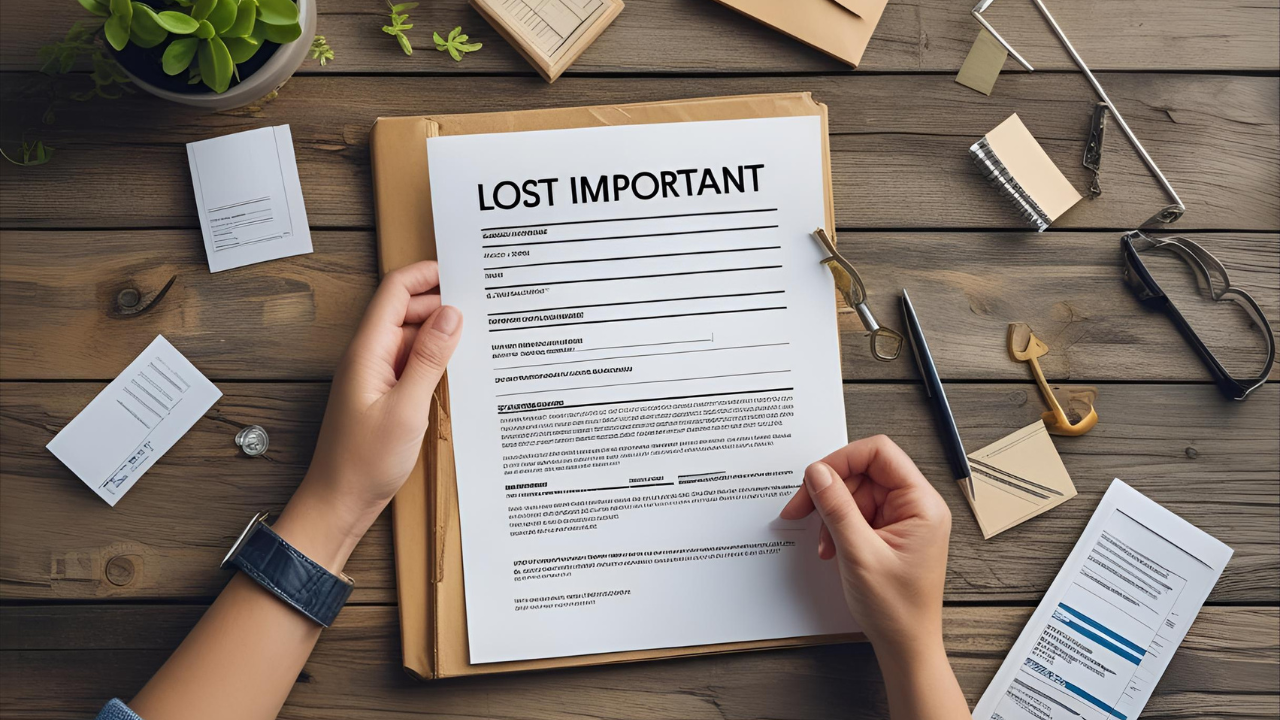Losing official documents can feel overwhelming, whether it’s your ID, passport, birth certificate, driver’s license, or educational records. These documents are essential for everyday tasks—from banking to job applications—and misplacing them can cause stress, delays, or even identity theft.
But don’t panic. This guide walks you through the exact steps to take when you’ve lost key documents, including how to report, replace, and protect yourself from further issues.
Table of Contents
- Why You Should Act Quickly
- Common Official Documents People Lose
- Step-by-Step Guide: What to Do Immediately
- Reporting the Loss to Authorities
- How to Replace Key Documents
- Preventing Identity Theft After Loss
- Tips to Keep Your Documents Safe in the Future
- Final Thoughts
1. Why You Should Act Quickly
Official documents aren’t just pieces of paper—they’re proof of identity, citizenship, education, and legal status. If they fall into the wrong hands, they could be used for fraud, unauthorized bank transactions, or impersonation.
Taking swift action helps protect your identity and speeds up the replacement process.
2. Common Official Documents People Lose
Here’s a list of commonly lost documents that often need immediate attention:
- National ID card
- Passport
- Driver’s license
- Birth certificate
- Voter ID
- Social security or pension ID
- Educational certificates
- Health insurance cards
- Tax documents or PAN cards
- Land ownership or rental papers
Each of these documents plays a specific role, so recovery steps vary depending on what’s lost.
3. Step-by-Step Guide: What to Do Immediately
Stay Calm and Retrace Your Steps
Start by checking all possible places—home, office, bags, lockers, cars. Sometimes, documents are simply misplaced and not actually lost.
Notify Family or Employers
Let your family or employer know if you’ve lost something that might affect legal responsibilities or job-related documents.
Block Access if Needed
For bank-related IDs or digital login credentials tied to lost documents, contact the relevant institutions to freeze accounts or reset passwords.
4. Reporting the Loss to Authorities
This step is essential, especially for IDs, passports, or licenses. File a loss report at your local police station or through your country’s online e-reporting system.
What You’ll Need:
- A valid government-issued ID (if available)
- A brief statement describing when and where you lost the document
- Contact details and proof of address
The police will issue a loss report or non-traceable certificate, which you’ll need to present when applying for replacements.
5. How to Replace Key Documents
Here’s how to begin replacing some of the most important lost documents:
A. Passport
- Report to the passport office or apply online through the official portal.
- Provide police report, recent photos, and identity proof.
B. National ID / Voter Card
- Visit your country’s national identity agency website.
- Use your mobile/email for verification and submit a reissue request.
- Some countries let you download a digital ID temporarily.
C. Driver’s License
- Report the loss to the traffic department or licensing authority.
- Apply for a duplicate license online or at a local office.
- Required: FIR, ID proof, and a passport-sized photo.
D. Educational Certificates
- Contact your school or university’s registrar or examination board.
- Submit a request form and pay the fee for a duplicate.
- You may need an affidavit or police report.
E. Social Security / Pension ID / Health Card
- Log in to the social welfare agency’s portal or call their helpline.
- Many countries allow digital re-issuance via apps or mail.
6. Preventing Identity Theft After Loss
Lost documents are not just an inconvenience—they can be a serious risk if they’re misused.
Here’s how to protect yourself:
- Monitor your bank statements and credit reports for suspicious activity.
- Inform your bank if a checkbook or card-related ID was lost.
- Change passwords for any digital services linked to your ID or address.
- Sign up for fraud alerts or ID protection services if available in your country.
7. Tips to Keep Your Documents Safe in the Future
To avoid similar issues in the future, follow these simple but powerful habits:
- Digitize your important documents by scanning and storing them securely online (e.g., in cloud storage with 2FA).
- Use document folders or organizers to avoid misplacing papers.
- Keep originals and photocopies separate to minimize total loss.
- Use waterproof and fireproof document safes at home.
- Avoid carrying too many documents at once unless absolutely necessary.
8. Final Thoughts
Losing official documents is frustrating—but not irreversible. Most agencies now offer streamlined, online processes for reporting and reapplying. Acting quickly, filing the right reports, and staying alert to any signs of misuse will help you recover fast and stay safe.
Remember: Always keep backup copies and store originals with care. The peace of mind is worth it.
Lost your documents recently? Bookmark or share this guide—you never know when you or someone close to you might need it.

